Charles E W Bean, Diaries, AWM38 3DRL 606/7/1 - May 1915 - Part 4
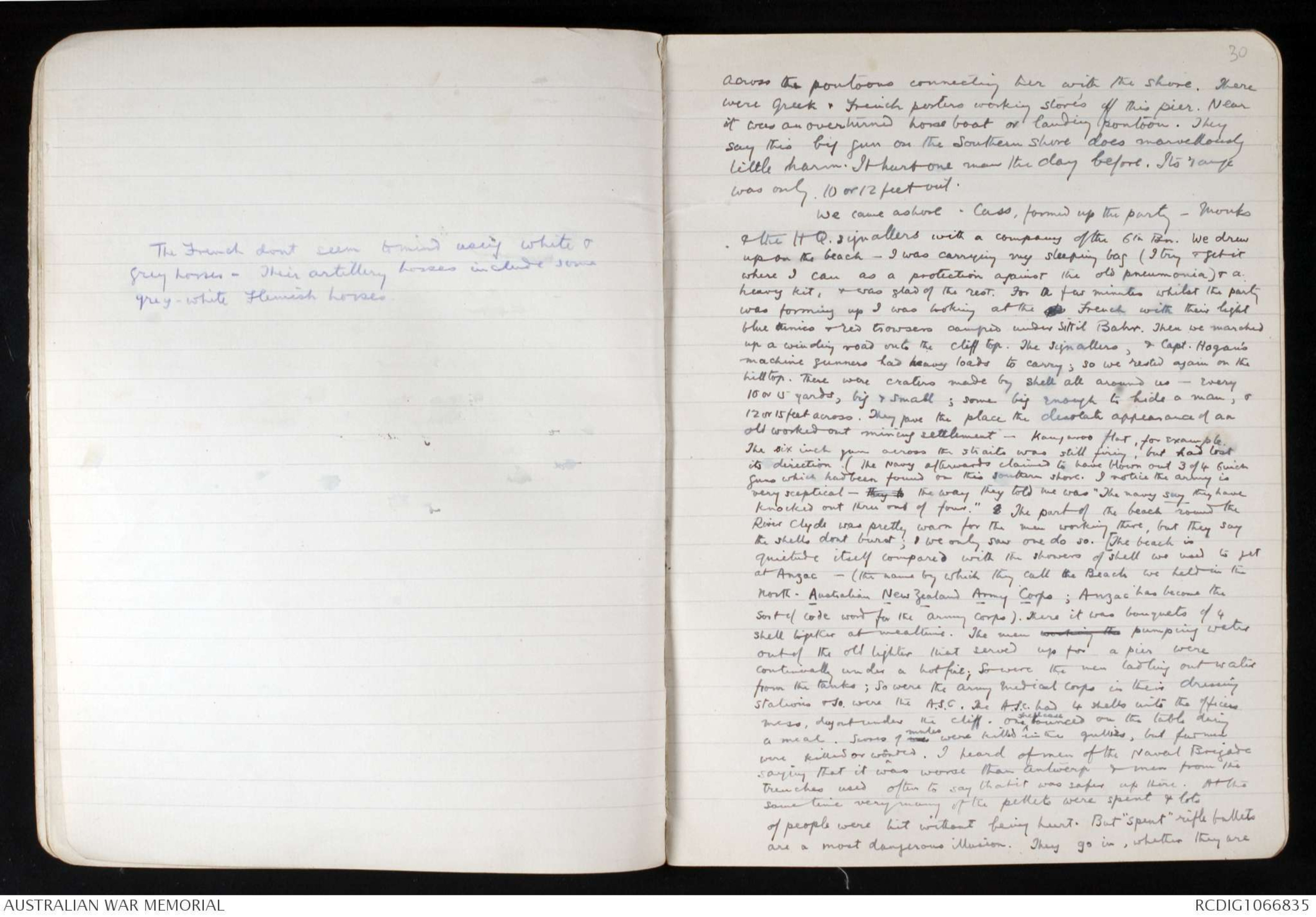
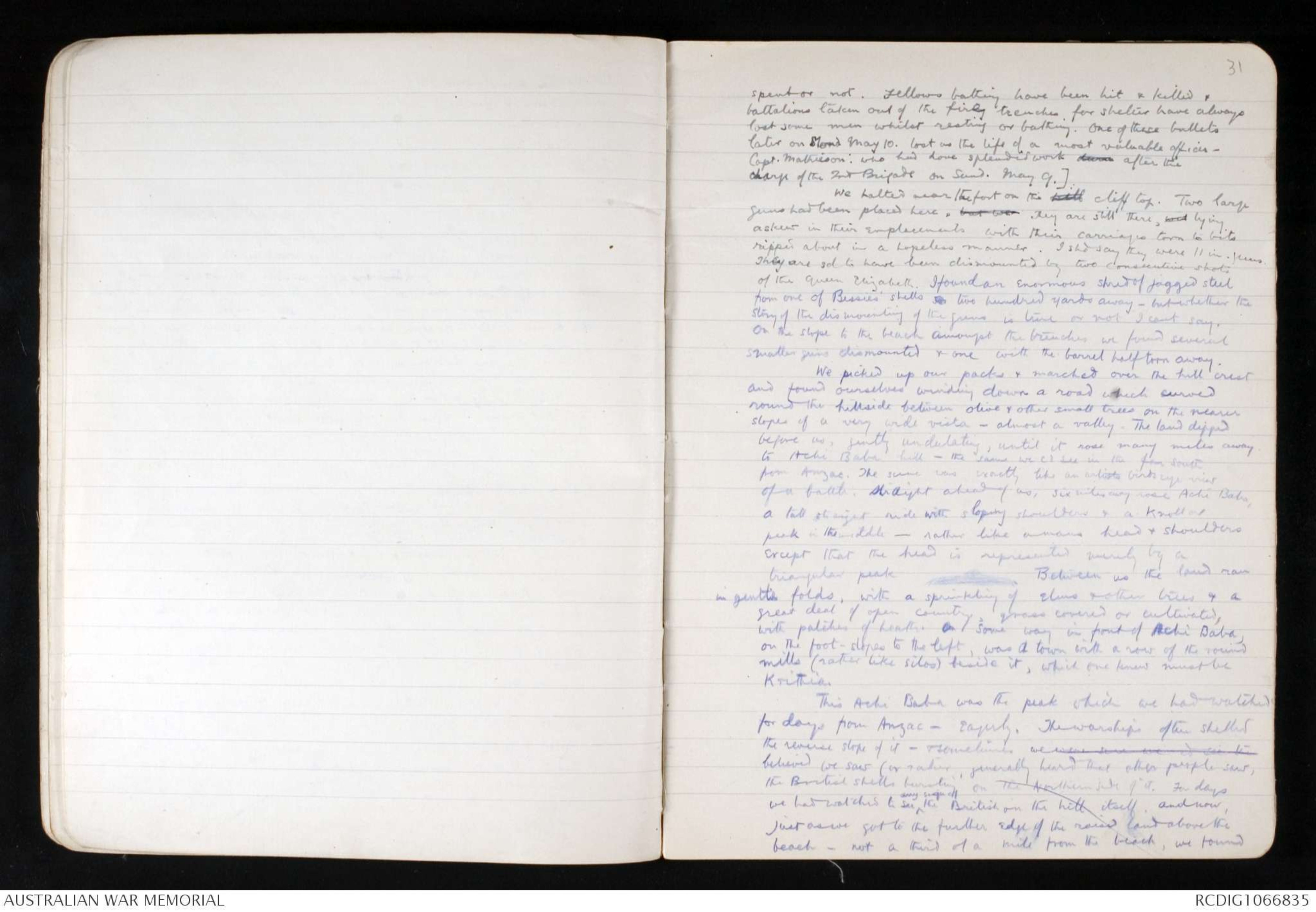
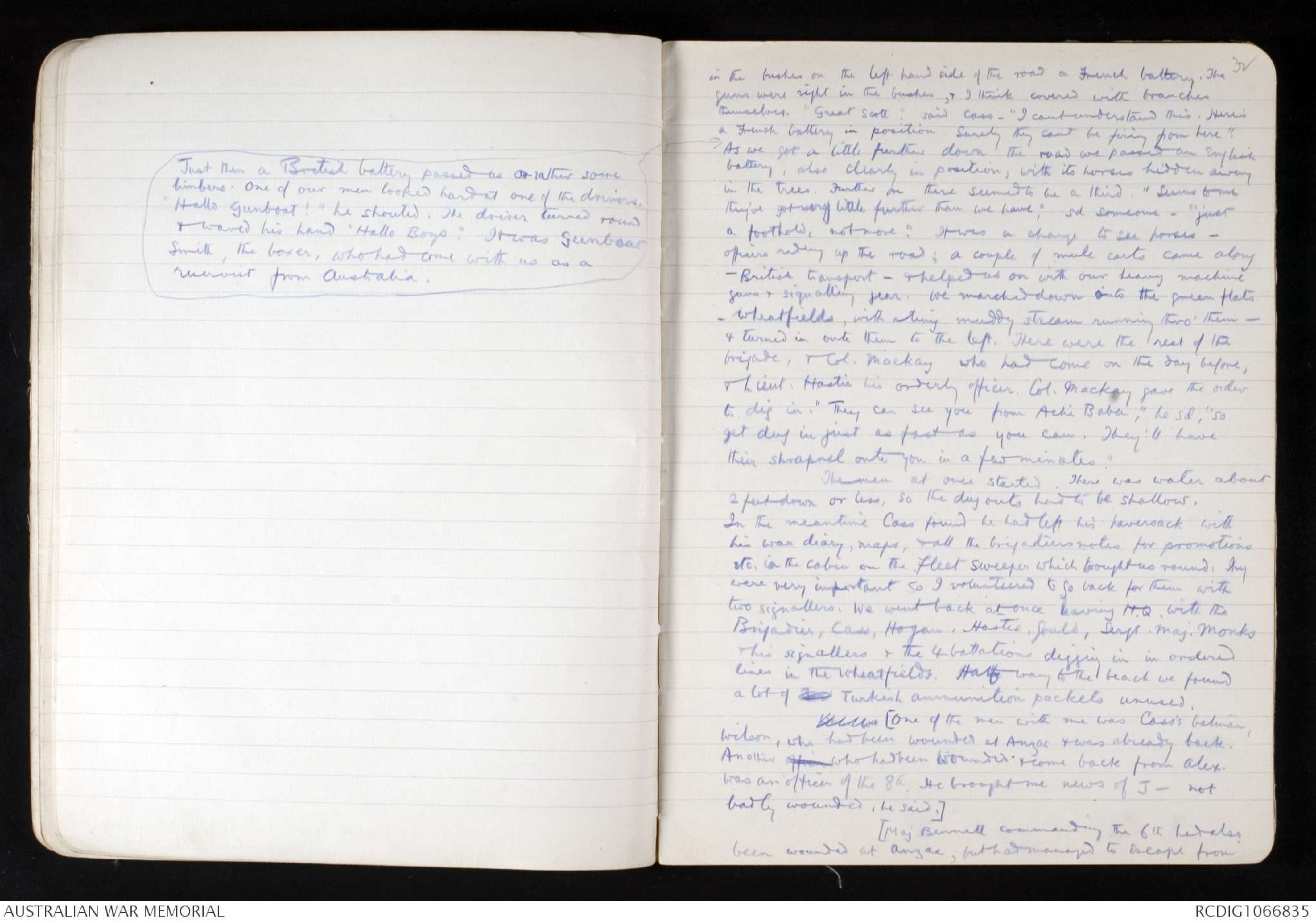
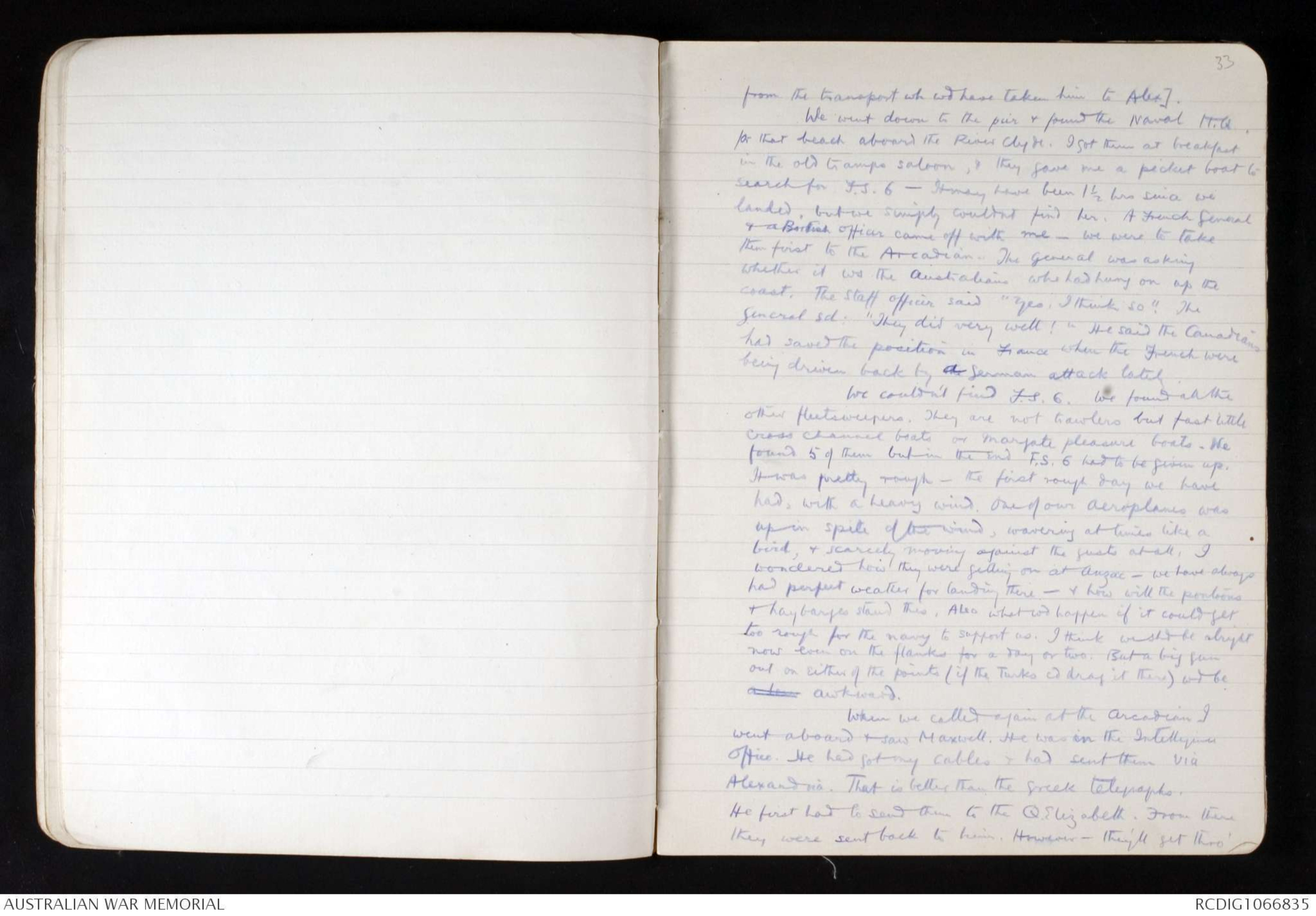
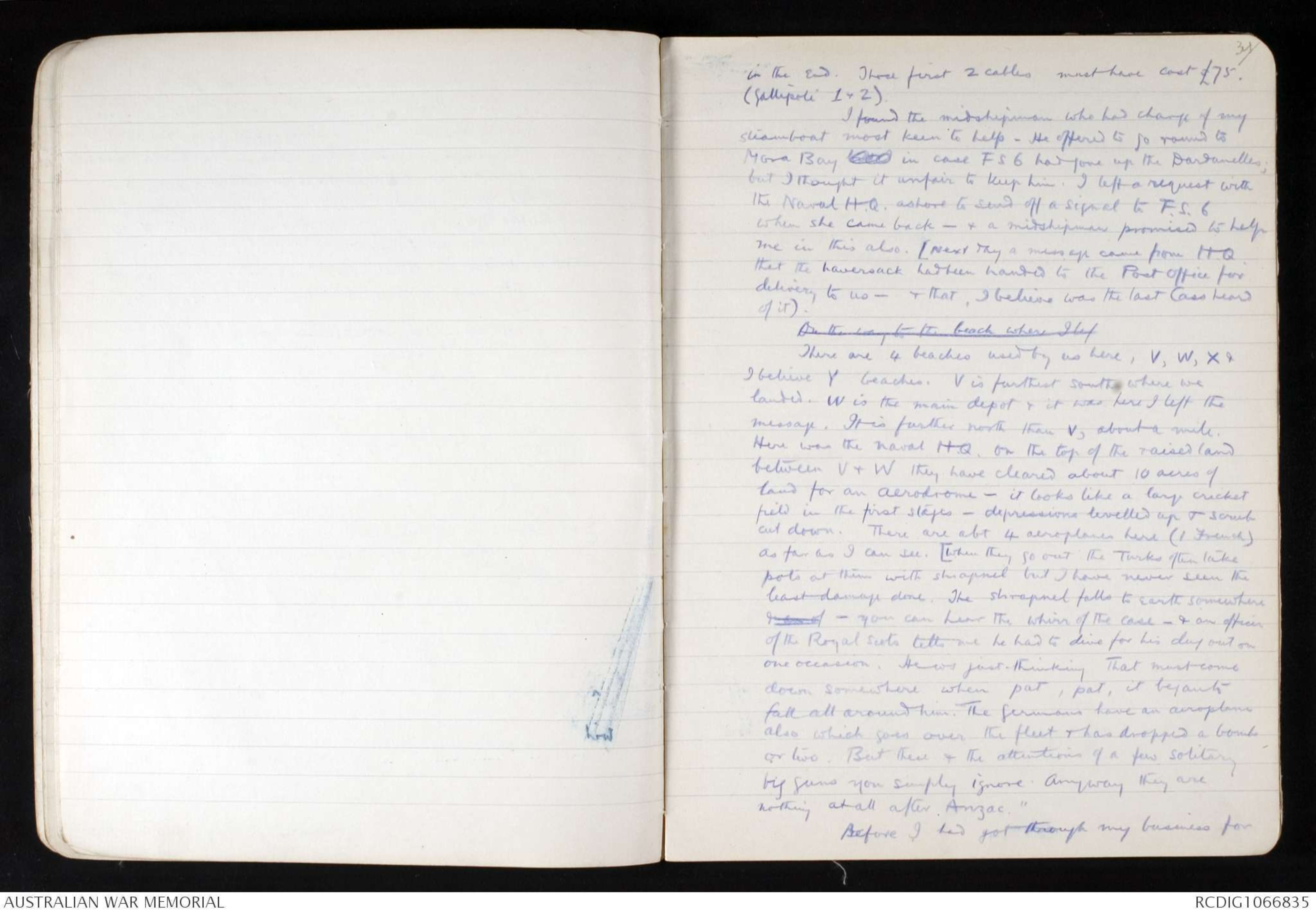
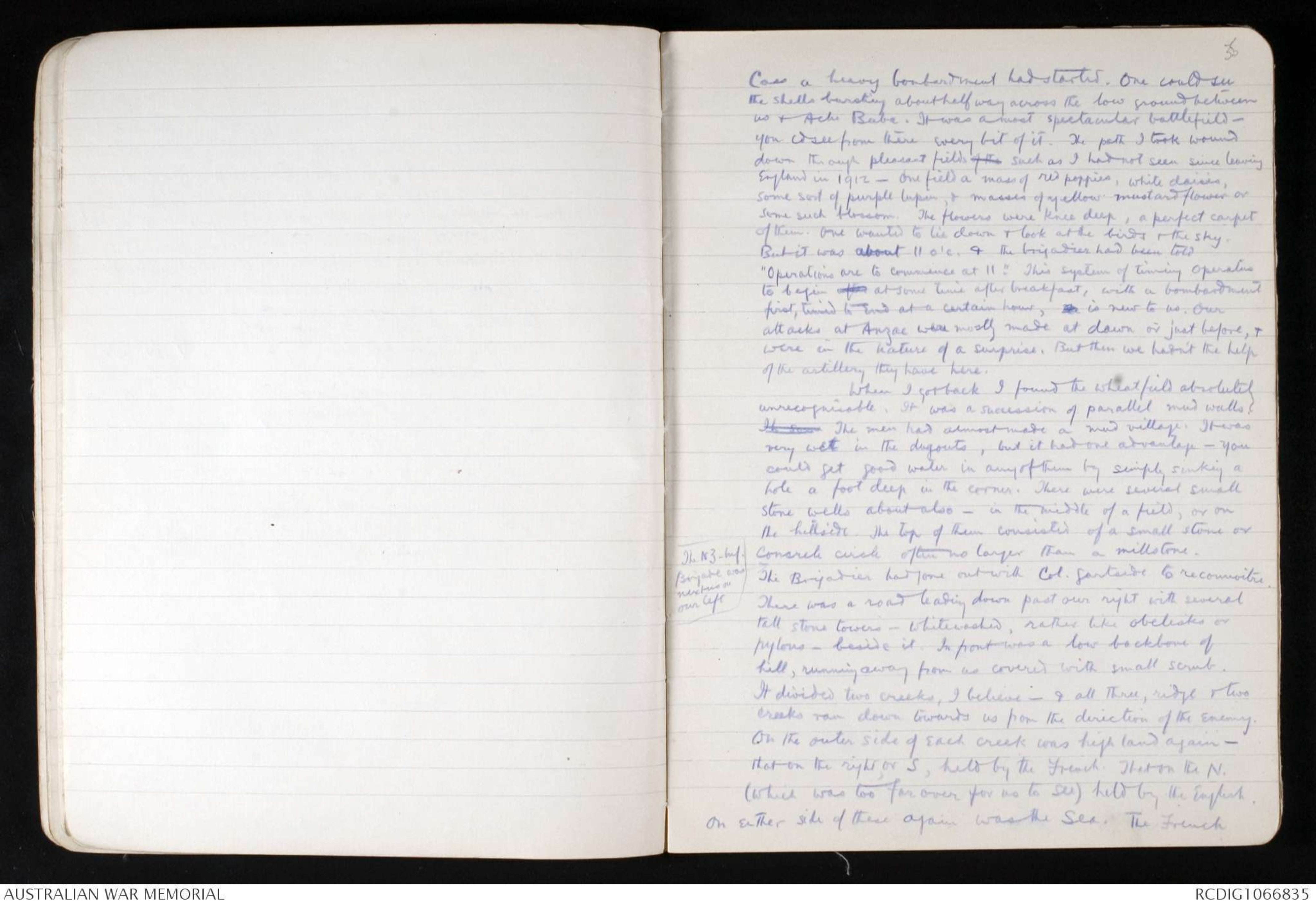
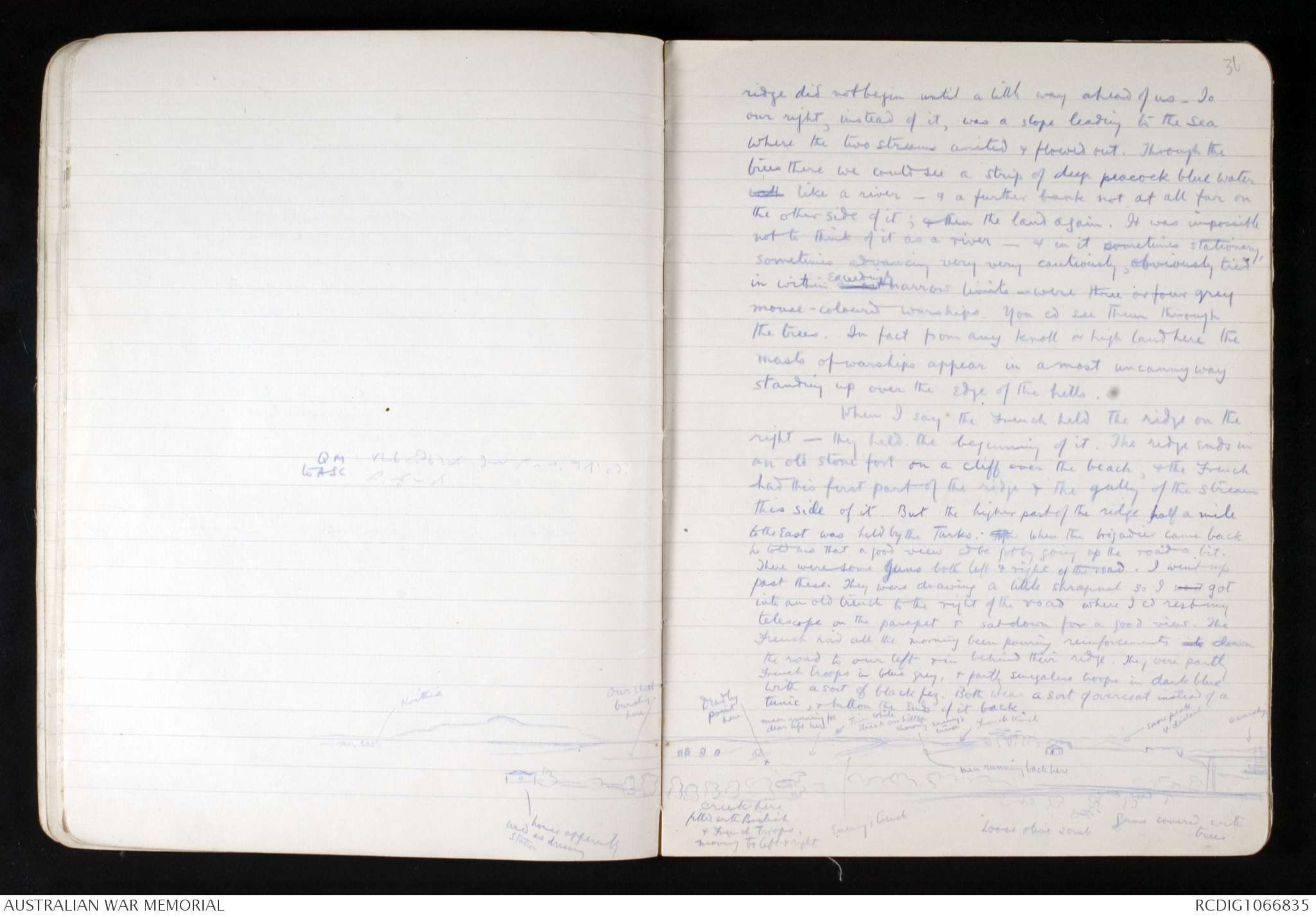
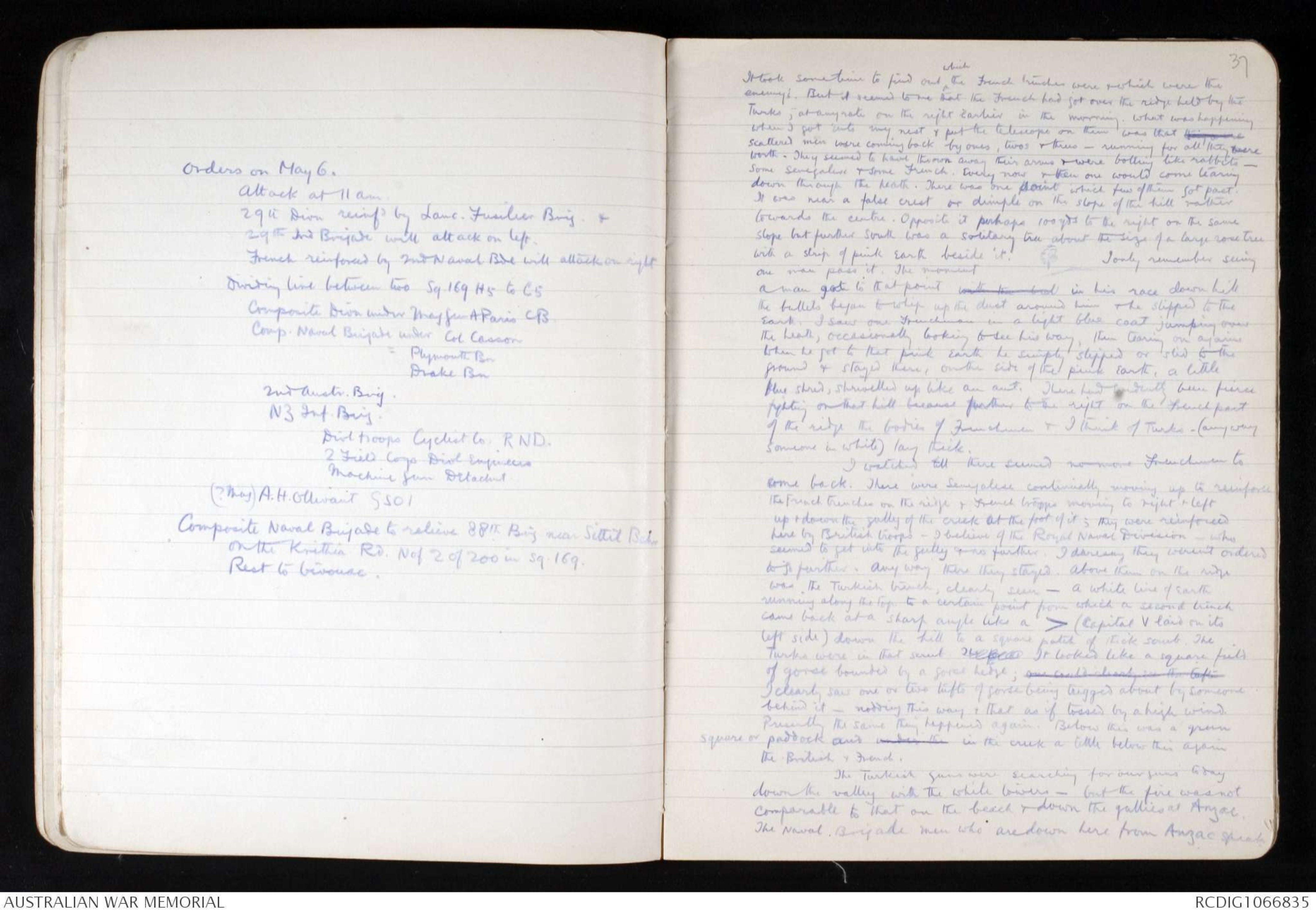
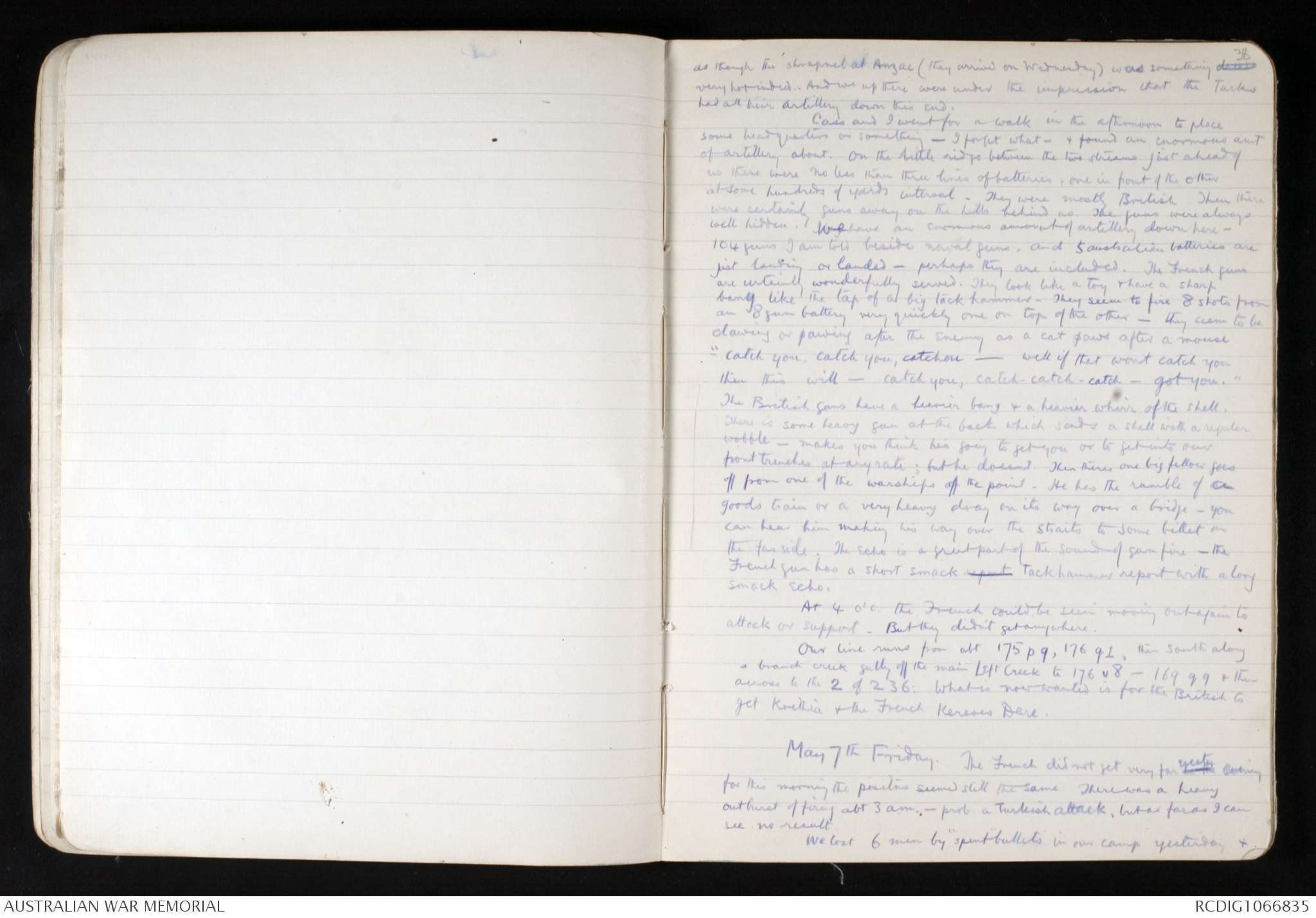
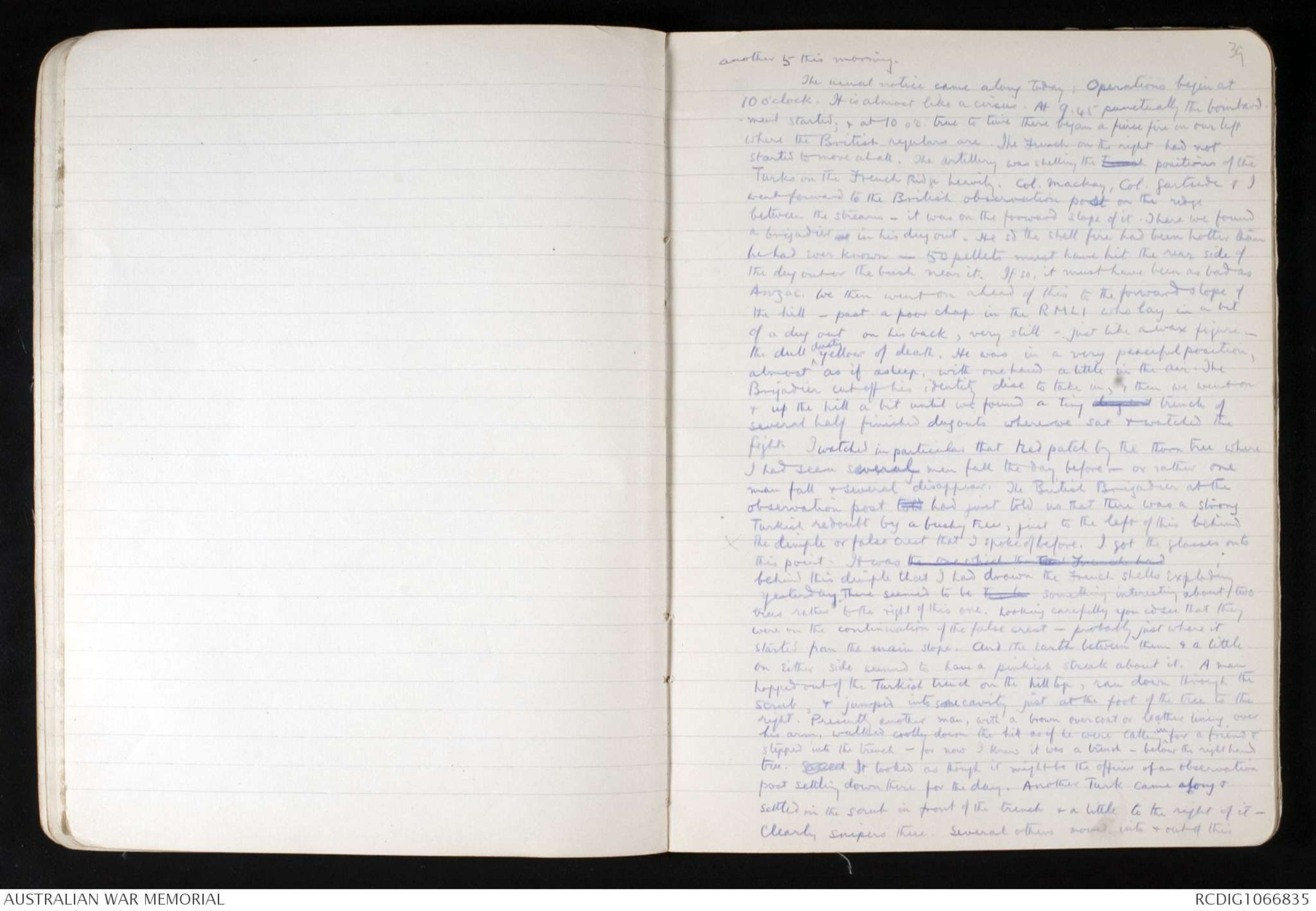
The French dont seem to mind using white &
grey horses - Their artillery horses include some
grey-white Flemish horses
30
across the pontoons connecting her with the shore. There
were Greek & French porters working store's off this pier. Near
it was an overturned house boat or landing pontoon. They
say this big gun on the Southern shore does marvellously
little harm. It hurt one man the day before. Its range
was only 10 or 12 feet out.
We came ashore. Cass, formed up the party - Monks
& the H.Q. signallers with a company of the 6th Bn. We drew
up on the beach - I was carrying my sleeping bag (I try & get it
where I can as a protection against the old pneumonia) & a
heavy kit, & was glad of the rest. For a few minutes whilst the party
was forming up I was looking at the xxx French with their light
blue tunics & red trowsers camped under Sittil Bahr. Then we marched
up a winding road onto the cliff top. The Signallers, & Capt. Hogan's
machine gunners had heavy loads to carry; so we rested again on the
hill top. There were craters made by shell all around us - every
10 or 15 yards, big & small; some big enough to hide a man, &
12 or 15 feet across. The gave the place the desolate appearance of an
old worked out mining settlement - Kangaroo flat, for example.
The six inch gun across the straits was still firing, but had lost
its direction. (The Navy afterwards claimed to have blown out 3 of 4 6inch
guns which had been found on this southern shore. I notice the army is
very sceptical - They to The way they told me was "The Navy say they have
knocked out three out of four." x The part of the beach round the
River Clyde was pretty warm for the men working there, but they say
the shells dont burst ; & x we only saw one do so. [The beach is
quietude itself compared with the showers of shell we used to get
at Anzac - (the name by which they call the Beach we held in the
north - Australian New Zealand Army Corps; Anzac has become the
sort of code word for the Army Corps). There it was bouquets of 4
shell together at mealtime. The men working the pumping water
out of the old lighter that served up for a pier were
continually under a hot fire; So were the men ladling out water
from the tanks; so were the Army Medical Corps in their dressing
stations & so were the A.S.C. The A.S.C. had 4 shells into the officers
mess, dug out under the cliff. One ^shell case bounced on the table during
a meal. Scores of xxx mules were killed in the gullies, but four men
were killed or wounded. I heard of men of the Naval Brigade
saying that it was worse than Antwerp & men from the
trenches used often to say that it was safer up there. At the
same time very many of the pellets were spent & lots
of people were hit without being hurt. But "spent" rifle bullets
are a most dangerous illusion. They go in, whether the are
31
spent or not. Fellows bathing have been hit & killed &
battalions taken out of the firing trenches for shelter have always
lost some men whilst resting or bathing. One of these bullets
later on Mond May 10. lost us the life of a most valuable officer -
Capt. Mathieson: who had done splendid work durin after the
charge of the 2nd Brigade on Sund. May 9.]
We halted near the fort on the hill cliff top. Two large
guns had been placed here. but we They are still there, wit lying
askew in their emplacements with their carriages torn to bits
ripped about in a hopeless manner. I shd say they were 11 in. guns.
They are sd to have been dismounted by two consecutive shots
of the Queen Elizabeth. I found an enormous shred of jagged steel
from one of Bessies' shells xx two hundred yards away - but whether the
story of the dismounting of the guns is true or not I cant say.
On the slope to the beach amongst the trenches we found several
smaller guns dismounted & one with the barrel half torn away.
We picked up our packs & marched over the hill crest
and found ourselves winding down a road which curved
round the hillside between olive & other small trees on the nearer
slopes of a very wide vista - almost a valley. The land dipped
before us, gently undulating, until it rose many miles away
to Achi Baba hill - the same we cd see in the far south
from Anzac. The scene was exactly like an artists birds eye view
of a battle. Straight ahead of us, six miles away rose Achi Baba,
a tall straight side with sloping shoulders & a knoll or
peak in the middle - rather like a mans head & shoulders
except that the head is represented merely by a
triangular peak. Between us the land ran
in gentle folds, with a sprinkling of elms & other trees & a
great deal of open country, grass covered or cultivated,
with patches of heath. A Some way in front of Achi Baba,
on the foot-slopes to the left, was a town with a row of the round
mills (rather like silos) beside it, which one knew must be
Krithia.
This Achi Baba was the peak which we had watched
for days from Anzac - eagerly. The warships often shelled
the reverse slope of it - & sometimes we were sure we cd see the
believed we saw (or rather, generally heard that other people saw,
the British shells bursting on the Northern side of it. For days
we had watched to see ^any sign of the British on the hill itself, and now,
just as we got to the further edge of the raised land above the
beach - not a third of a mile from the beach, we found
Just then a British battery passed us or rather some
limbers. One of our men looked hard at one of the drivers.
"Hallo Gunboat!" he shouted. The driver turned round
& waved his hand "Hallo Boys." It was Gunboat
Smith, the boxer, who had come with us a
reservist from Australia.
32
in the bushes on the left hand side of the road a French battery. The
guns were right in the bushes, & I think covered with branches
themselves. "Great Scott." said Cass - "I cant understand this. Here's
a French battery in position. Surely they cant be firing from here".
As we got a little further down the road we passed an English
battery, also clearly in position, with its horses hidden away
in the trees. Further on there seemed to be a third, "Seems to me
they've got very little further that we have," sd someone - "just
a foothold, not more." It was a change to see horses -
officers riding up the road; a couple of mule carts came along
- British transport - & helped us on with our heavy machine
guns & signalling gear. We marched down into the green flats
- wheatfields, with a tiny muddy stream running thro' them -
& turned in onto them to the left. There were the rest of the
brigade, & Col. Mackay who had come on the day before,
& Lieut. Hastie his orderly officer. Col. Mackay gave the order
to dig in. "They can see you from Achi Baba," he sd, "so
get dug in just as fast as you can. They'll have
their shrapnel onto you in a few minutes."
The men at once started. There was water about
2 feet down or less, so the dug outs had to be shallow.
In the meantime Cass found he had left his haversack with
his war diary, maps, & all the brigadiers notes for promotions
etc. in the cabin on the Fleet Sweeper which brought us round. They
were very important so I volunteered to go back for them with
two signallers. We went back at once leaving H.Q. with the
Brigadier, Cass, Hogan, Hastie, Gould, Sergt. Maj. Monks
& his signallers & the 4 battalions digging in in ordered
lines in the wheatfields. Half way to the beach we found
a lot of xxx Turkish ammunition packets unused.xxxx [One of the men with me was Cass's batman,
Wilson, who had been wounded at Anzac & was already back.
Another officer who had been wounded & come back from Alex.
was an officer of the 8th. He brought me news of J - not
badly wounded, he said.]
[Maj. Bennett commanding the 6th had also
been wounded at Anzac, but had managed to escape from
33
from the transport wh wd have taken him to Alex].
We went down to the pier & found the Naval H.Q.
for that beach aboard the River Clyde. I got them at breakfast
in the old tramps saloon, & they gave me a picket boat to
search for F.S. 6 - It may have been 1½ hrs since we
landed, but we simply couldnt find her. A French General
& a British officer came off with me - we were to take
them first to the Arcadian. The General was asking
whether it ws the Australians who had hung on up the
coast. The Staff officer said "Yes, I think so." The
General sd: "They did very well!" He said the Canadians
had saved the position in France where the French were
being driven back by a German attack lately.
We couldn't find F.S. 6. We found all the
other fleetsweepers. They are not trawlers but fast little
cross channel boats or Margate pleasure boats. We
found 5 of them but in the end F.S. 6 had to be given up.
It was pretty rough - the first rough day we have
had, with a heavy wind. One of our aeroplanes was
up in spite of the wind, wavering at times like a
bird, & scarcely moving against the gusts at all, I
wondered how they were getting on at Anzac - we have always
had perfect weather for landing there - & how will the pontoons
& haybarges stand this. Also what cd happen if it could get
too rough for the navy to support us. I think we shd be alright
now even on the flanks for a day or two. But a big gun
out on either of the points (if the Turks cd drag it there) wd bea less awkward.
When we called again at the Arcadian I
went aboard & saw Maxwell. He was in the Intelligence
Office. He had got my cables & had sent them via
Alexandria. That is better than the Greek telegraphs.
He first had to send them to the Q. Elizabeth. From there
they were sent back to him. However - they'll get thro'
34
in the end. Those first 2 cables must have cost £75.
(Gallipoli 1 & 2).
I found the midshipman who had charge of my
steamboat most keen to help - He offered to go round to
Mora Bay xxxx in case F S 6 had gone up the Dardanelles;
but I thought it unfair to keep him. I left a request with
the Naval H.Q. ashore to send off a signal to F.S. 6
when she came back - & a midshipman promised to help
me in this also. [Next day a message came from H.Q.
that the haversack had been handed to the Post Office for
delivery to us - & that, I believe was the last Cass heard
of it).On the way to the beach where I lef
There are 4 beaches used by us here, V, W, X &
I believe Y beaches. V is furthest south where we
landed. W is the main depot & it was here I left the
message. It is further north than V, about a mile.
Here was the Naval H.Q. on the top of the raised land
between V & W they have cleared about 10 acres of
land for an aerodrome - it looks like a large cricket
field in the first stages - depressions levelled up & scrub
cut down. There are abt 4 aeroplanes here (1 French)
as far as I can see. [When they go out the Turks often take
pots at them with shrapnel but I have never seen the
least damage done. The shrapnel falls to earth somewhere& end of - you can hear the whirr of the case - & an officer
of the Royal Scots tells me he had to dive for his dugout on
one occasion. He ws just thinking that must come
down somewhere when pat, pat, it began to
fall all around him. The Germans have an aeroplane
also which goes over the fleet & has dropped a bomb
or two. But these & the attentions of a few solitary
big guns you simply ignore. Anyway they are
nothing at all after Anzac."
Before I had got through my business for
35
Cass a heavy bombardment had started. One could see
the shells bursting about half way across the low ground between
us & Achi Baba. It was a most spectacular battlefield -
you cd see from there every bit of it. The path I took wound
down through pleasant fields of the such as I had not seen since leaving
England in 1912 - One field a mass of red poppies, white daises,
some sort of purple lupin , & masses of yellow mustard flower or
some such blossom. The flowers were knee deep, a perfect carpet
of them. One wanted to lie down & look at the birds & the sky.
But it was about 11 o'c & the Brigadier had been told
"Operations are to commence at 11." This system of timing operations
to begin after at some time after breakfast, with a bombardment
first, timed to end at a certain hour, is new to us. Our
attacks at Anzac were mostly made at dawn or just before, &
were in the nature of a surprise. But then we hadn't the help
of the artillery they have here.
When I got back I found the wheatfield absolutely
unrecognisable. It was a succession of parallel mud walls.It se The men had almost made a mud village. It was
very wet in the dugouts, but it had one advantage - you
could get good water in any of them by simply sinking a
hole a foot deep in the corner. There were several small
stone wells about also - in the middle of a field, or on
the hillside. The top of them consisted of a small stone or
concrete circle often no larger than a millstone.
[*The N.Z. Inf.
Brigade was
next us on
our left*]
The Brigadier had gone out with Col. Gartside to reconnoitre.
There was a road leading down past our right with several
tall stone towers - whitewashed, rather like obelisks or
pylons - beside it. In front was a low backbone of
hill, running away from us covered with small scrub.
It divided two creeks, I believe - & all three, ridge & two
creeks ran down towards us from the direction of the enemy.
On the outer side of each creek was high land again -
that on the right, or S, held by the French. That on the N.
(which was too far over for us to see) held by the English.
On either side of these again was the Sea. The French
QM [[shorthand]]
to ASC [[shorthand]]
Diagram - see original document
36
ridge did not begin until a little way ahead of us. To
our right, instead of it, was a slope leading to the sea
where the two streams united & flowed out. Through the
trees there we could see a strip of deep peacock blue waterwith like a river - & a further bank not at all far on
the other side of it; & then the land again. It was impossible
not to think of it as a river - & in it sometimes stationary,
sometimes advancing very very cautiously, obviously tied
in within xxxx exceedingly narrow limits - were three or four grey
mouse-coloured warships. You cd see them through
the trees. In fact from any knoll or high land here the
masts of warships appear in a most uncanny way
standing up over the edge of the hills.
When I say the French held the ridge on the
right - they held the beginning of it. The ridge ends in
an old stone fort on a cliff over the beach, & the French
had this first part of the ridge & the gully of the stream
this side of it. But the higher part of the ridge half a mile
to the East was held by the Turks: xxx When the brigadier came back
he told me that a good view cd be got by going up the road a bit.
There were some guns both left & right of the road. I went up
past these. They were drawing a little shrapnel so I went got
into an old trench to the right of the road where I cd rest my
telescope on the parapet & sat down for a good view. The
French had all the morning been pouring reinforcements xxx down
the road to our left & in behind their ridge. They were partly
French troops in blue grey, & partly Senegalese troops in dark blue
with a sort of black fez. Both wear a sort of overcoat instead of a
tunic, and button the ends of it back.
Diagram - see original document
Orders on May 6.
Attack at 11am.
29th Divn reinfd by Lanc. Fusilier Brig. &
29th Ind Brigade will attack on left.
French reinforced by 2nd Naval Bde will attack on right
Dividing line between two Sq 169 H5 to C5
Composite Divn under Maj. Gen. A Paris CB
Comp. Naval Brigade under Col. Casson
= Plymouth Bn
Drake Bn
2nd Austr. Brig.
NZ Inf. Brig.
Divl troops Cyclist Co. RND.
2 Field Coys Divl Engineers
Machine Gun Detachmt
(?Maj) A.H. Ollivant GSO1
Composite Naval Brigade to relieve 38th Brg near Sittil Bahr
on the Krithia Rd. N of 2 of 200 in sq. 169.
Rest to bivouac.
37
It took sometime to find out ^which the French trenches were & which were the
enemy's. But it seemed to me that the French had got over the ridge held by the
Turks, at any rate on the right earlier in the morning. What was happening
when I got into my nest & put the telescope on them was that xxxx xxxx
scattered men were coming back by ones, twos and threes - running for all they were
worth. They seemed to have thrown away their arms & were bolting like rabbits -
Some Senegalese & some French. Every now & then one would come tearing
down through the heath. There was one point which few of them got past.
It was near a false crest or dimple on the slope of the hill rather
towards the centre. Opposite it perhaps 100 yds to the right on the same
slope but further South was a solitary tree about the size of a large rose tree
with a strip of pink earth beside it. Diagram - see original I only remember seeing
one man pass it. The moment
a man got to that point with the brol in his race down hill
the bullets began to whip up the dust around him & he slipped to the
earth. I saw one Frenchman in a light blue coat jumping over
the heath, occasionally looking to see his way, then tearing on again
when he got to that pink earth he simply slipped or slid to the
ground & stayed there, on the side of the pink earth, a little
blue shred, shrivelled up like an ant. There had evidently been fierce
fighting on that hill because further to the right on the French part
of the ridge the bodies of Frenchmen & I think of Turks - (anyway
someone in white) lay thick.
I watched till there seemed no more Frenchmen to
come back. There were Senegalese continually moving up to reinforce
the French trenches on the ridge & French troops moving to right & left
up & down the gully of the creek at the foot of it; they were reinforced
here by British troops - I believe of the Royal Naval Division - who
seemed to get into the gully & no further. I daresay they weren't ordered
to go further. Any way there they stayed. Above them on the ridge
was the Turkish trench, clearly seen - a white line of earth
running along the top to a certain point from which a second trench
came back at a sharp angle like a > (Capital V laid on its
left side) down the hill to a square patch of thick scrub. The
Turks were in that scrub. xxxxxxx It looked like a square field
of gorse bounded by a gorse hedge; and could already in the xxxxxxx
I clearly saw one or two tufts of gorse being tugged about by someone
behind it - nodding this way & that as if tossed by a high wind.
Presently the same thing happened again. Below this was a green
square or paddock and under the in the creek a little below this again
the British & French.
The Turkish guns were searching for our guns today
down the valley with the white towers - but the fire was not
comparable to that on the beach & down the gullies at Anzac.
The Naval Brigade men who are down here from Anzac speak
38
as though the shrapnel at Anzac (they arrived on Wednesday) was something dead
very hot indeed. And we up there were under the impression that the Turks
had all their artillery down this end.
Cass and I went for a walk in the afternoon to place
some headquarters of something - I forget what - & found an enormous amt
of artillery about. On the little ridge between the two streams just ahead of
us there were no less than three lines of batteries, one in front of the other
at some hundreds of yards interval. They were mostly British. Then there
were certainly guns away on the hills behind us. The guns were always
well hidden. We have an enormous amount of artillery down here -
104 guns I am told beside naval guns. And 5 Australian batteries are
just landing or landed - perhaps they are included. The French guns
are certainly wonderfully served They look like a toy & have a sharp
bang like the tap of a big tack hammer - They seem to fire 8 shots from
an 8 gun battery very quickly one on top of the other - they seen to be
clawing or pawing after the enemy as a cat paws after a mouse
-"catch you, catch you, catchou - well if that wont catch you
then this will - catch you, catch - catch- catch - got you."
The British guns have a heavier bang & a heavier whirr of the shell.
There is some heavy gun at the back which sends a shell with a regular
wobble - makes you think he's going to get you or to get into our
front trenches at any rate; but he doesnt. Then theres one big fellow goes
off from one of the warships off the point. He has the rumble of a
goods train or a very heavy dray on its way over a bridge - you
can hear him making his way over the straits to some billet on
the far side. The echo is a great part of the sound of gun fire - the
French gun has a short smack report tack hammer report with a long
smack echo.
At 4 o'c. the French could be seen moving out again to
attack or support - But they didn't get anywhere.
Our line runs from abt 175 p q, 176 q 1, then south along
a branch creek gully off the main Left Creek to 176 v 8 - 169 q q & then
across to the 2 of 236. What is now wanted is for the British to
get Krithia & the French Kereves Dere.
May 7th Friday. The French did not get very far to the yesty evening
for this morning the positns seemed still the same. There was a heavy
outburst of firing abt 3am. - prob a Turkish attack, but as far as I can
see no result.
We lost 6 men by "spent" bullets in our camp yesterday &
39
another 5 this morning.
The usual notice came along today: Operations begin at
10 o'clock. It is almost like a circus. At 9.45 punctually the bombardment
started; & at 10 o'c true to time there began a fierce fire on our left
where the British regulars are. The French on the right had not
started to move at all. The artillery was shelling the trench positions of the
Turks on the French Ridge heavily. Col. Mackay, Col. Gartside & I
went forward to the British observation post on the ridge
between the streams - it was on the forward slope of it. There we found
a brigadier at in his dug out. He sd the shell fire had been hotter than
he had ever known - 50 pellets must have hit the rear side of
the dug out or the bush near it. If so, it must have been as bad as
Anzac. We then went on ahead of this to the forward slope of
the hill - past a poor chap in the RMLI who lay in a bit
of a dug out on his back, very still - just like a wax figure -
the dull ^dusty yellow of death. He was in a very peaceful position,
almost as if asleep, with one hand a little in the air. The
Brigadier cut off his identity disc to take in, & then we went on
& up the hill a bit until we found a tiny dugout trench of
several half finished dugouts where we sat & watched the
fight. I watched in particular that red patch by the thorn tree where
I had seen several men fall the day before - or rather one
man fall & several disappear. The British Brigadier at the
observation post told had just told us that there was a strong
Turkish redoubt by a bushy tree, just to the left of this behind
[*X*]
the dimple or false crest that I spoke of before. I got the glasses onto
this point. It was the one which Tur French had
behind this dimple that I had drawn the French shells exploding
yesterday. There seemed to be xxx xx something interesting about two
trees rather to the right of this one. Looking carefully you cd see that they
were in the continuation of the false crest - probably just where it
started from the main slope. And the earth between them & a little
on either side seemed to have a pinkish steak about it. A man
hopped out of the Turkish trench on the hilltop, ran down through the
scrub, & jumped into some cavity just at the foot of the tree to the
right. Presently another man, with a brown overcoat or leather lining over
his arm, walked coolly down the hill as if he were calling ^in for a friend &
stepped into the trench - for now I knew it was a trench - below the right hand
tree. Xxxxxx It looked as though it might be the officer of an observation
post settling down there for the day. Another Turk came along &
settled in the scrub in front of the trench & a little to the right of it -
Clearly snipers there. Several others moved into & out of this
 Deb Parkinson
Deb ParkinsonThis transcription item is now locked to you for editing. To release the lock either Save your changes or Cancel.
This lock will be automatically released after 60 minutes of inactivity.